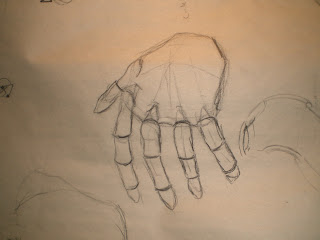Here is a front on shot of my manekin. Shown here is the rectus abdominis, this muscle was rather easy to create. I cut a long piece of clay with my razor and flattened out and cut it took look like the rectus abdominis. This muscle flexes the lumbar vertebrae and helps depress the ribs and compress the abs in forced expiration. Also shown is the Abdominis external obliquus. This is the muscle that goes over the ribcage. This piece was pretty simple to create as well, just cut the overall shape of the muscle and than molded it to the ribs. This muscle does the same as the rectus except it also compresses the opposite side of the rotator of the thoracic vertebrae.

This is a back view of my manekin. You can see all of the spinal erectors in this picture. Bigger muscles shown in this picture are the Longissimus throacis. This is muscle is a long thick muscle that is in between the spine and the ribcage. It extends and laterally flexes the lumbar vertebrae. Rotator of the thoracic vertebrae. Another big muscle shown is the iliocostalis lumborum. These muscles were rather easy to build, except for the longissimus took awhile to get formed the right way. The iliocostalis muscle is the wing shaped muscle that touches the spine and is mostly seen on the ribcage. it extends and laterally flexes the lumbar vertebrae, same side rotator of the lower thoracic vertebrae. Also shown in this image is a smaller muscle called the quadratus lumborum. This muscle is shown in between the pelvis and the bottom of the ribcage. It's sort of a triangle shape. It's job is to extend laterally flex the lumbar spine, and depress and stabilize the 12th rib.

This image is a nice close up of the spinal erectors. Included in this image are the spinalis capitus. The medium length muscle that goes from the bottom of the skull to about the 4th vertebrae on the spine. This muscle extends the cervical vertebrae and head; it also laterally flexes and rotates the head. We also see longissimus capitis this muscle attaches and twists from the top of the cranial dorsal process, and attaches to the caudal Transverse process of vertebrae c4 to T5. This is muscle was difficult to make because it has to twist under the longissimus cervicis. The capitis extends and laterally flexes the head and cervical vertebrae. Rotates the head to the opposite side. The muscle that twists and rolls over the capitis is called the longissimus cervicis. And this muscle extends, laterally flexes the cervical vertebrae. And it attaches to the Transverse processes of the C2 to C6 vertebrae to the Transverse processes of vertebrae T1&T5.
We also see the Iliocostalis Cervicis which connects to the posterior tubercles of the tranxverse processes of vertebrae C4 to C6. To Angles of ribs 3 to 6. It is the muscle that comes out from the longissimus muscles. And beneath that we don't see to well in this picture is the Iliocstalis thoracis. This muscle rotates thoracic vertebrae to the same side. It is located on ribs 1 to 6.











 RECENT GESTURES
RECENT GESTURES



 In this image you see and don't see several of the thigh muscles because of the layering of the muscles. We've got the Vastus Intermedialis which extends the knee, and the Vastus Medialis Which Extends the knee, displaces the platella medially and rotates the femur laterally on the tibia. And the Vastus Lateralis which are not seen because they are covered by other muscles of the thigh. The Rectus Femoris which flexes the hip, bringing the thigh against the thorax.
In this image you see and don't see several of the thigh muscles because of the layering of the muscles. We've got the Vastus Intermedialis which extends the knee, and the Vastus Medialis Which Extends the knee, displaces the platella medially and rotates the femur laterally on the tibia. And the Vastus Lateralis which are not seen because they are covered by other muscles of the thigh. The Rectus Femoris which flexes the hip, bringing the thigh against the thorax. This view gives a better shot of the thigh muscles, we are able to see parts of vastus muscles in this image.
This view gives a better shot of the thigh muscles, we are able to see parts of vastus muscles in this image. We start to see the Adductor Longus wrap from the bottom of the pelvis to the side of the femur. And this muscle Adducts and Flexes the hip. We also see the Adductor Brevis which also connects from the pelvis to the top of the femur which also flexes and adducts the hip. In the back we also see the thicker group of muscles which include the Adductor Magnus which adducts, flexes and laterally rotates the hip. The thinner muscle on the out side of the Magnus is the gracilis which flexes and medially rotates the knee, and adducts the hip.
We start to see the Adductor Longus wrap from the bottom of the pelvis to the side of the femur. And this muscle Adducts and Flexes the hip. We also see the Adductor Brevis which also connects from the pelvis to the top of the femur which also flexes and adducts the hip. In the back we also see the thicker group of muscles which include the Adductor Magnus which adducts, flexes and laterally rotates the hip. The thinner muscle on the out side of the Magnus is the gracilis which flexes and medially rotates the knee, and adducts the hip.









 More Work Soon....
More Work Soon....

